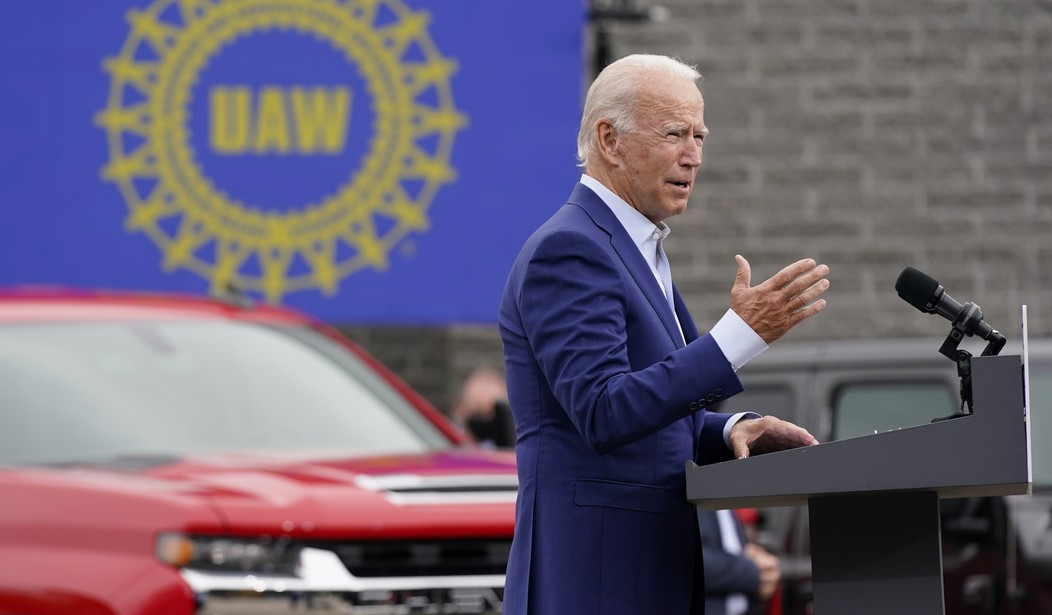It’s union negotiating season again and, wow. This time, the United Auto Workers have decided to go “all in” when it comes to wage and benefit increases.
As one wag once said, auto companies don’t exist to make cars anymore. They exist to provide pensions and benefits to its union workers. And after this next contract is settled — probably after a prolonged strike — those pensions and benefits are going to skyrocket.
The UAW has decided to negotiate with all three major auto manufacturers this year. In the past, they usually chose one company with which to negotiate the agreement then covering all three majors. But this year, it’s going to be different.
UAW President Shawn Fain has declared “war” on the corporations and warned the union’s demands would be “the most audacious list of proposals they have seen in decades.”
How “audacious”?
- 32-hour workweek
- 46 percent pay raise over four years
- Right to strike over plant closures
- Increased retiree benefits
- Defined pension plan for all workers
- Cost of living adjustments
The new contract would add $80 billion to each company’s labor costs. Bloomberg reports, “That large an increase to labor costs over the contract’s four-year term could wipe out profits and threaten the carmakers’ futures,” according to people familiar with the analysis.
It would increase hourly labor costs to more than $150 per hour at Ford Motor Co. and General Motors Co., including wages and benefits, up from the $64 an hour GM, Ford, and Stellantis NV workers currently make.
This Fain fellow is a real firebreather.
UAW President Shawn Fain just read lines from Stellantis's early bargaining proposals and then chucked them in a trash can. pic.twitter.com/lWBfx3UdSd
— Michael Martinez (@MikeMartinez_AN) August 8, 2023
The negotiations come as US automakers are pouring tens of billions into designing and building EVs, while trying boost profits on conventional gas-fuel vehicles to pay for it. Fain has accused them of engaging in a “race to the bottom” in the transition to electric vehicles, with factories that will employ fewer workers making lower wages.
On Tuesday, Fain lashed out against Stellantis for its starting proposal in labor negotiations, calling it a “slap in the face” during a livestream on Facebook and accusing the owner of the Jeep and Ram brands of lying to its workers about how aggressive its asks are.
In 2019, the workers walked out for 40 days, costing GM and Ford billions of dollars. But even a shorter strike would still be crippling.
GM losses would be $380 million through a 10-day strike, according to Anderson Economic Group, a Michigan-based consulting firm. That compares to estimates of $325 million for Ford and $285 million impact on Stellantis.
“AEG’s estimates do not include UAW strike pay or assessments for strike pay, unemployment benefits or unemployment taxes, income taxes on wages and other potential effects such as settlement bonuses,” according to CNBC.
The automakers have dug their own graves by investing so heavily in electric vehicles. Even with government subsidies, the industry is selling EVs at a loss.
As an example, Ford currently loses about -$30k per Mustang Mach-E manufactured and are likely years away from consistent profitability if sales grow. However, so far this year, Ford is experiencing days-on-hand of inventory 100+ days, significantly above the industry average of 60, signaling poor demand.
Ford recently dropped prices to increase sales, which will likely cause them to lose more money per vehicle, at least in the short term in the hopes sales increase dramatically. We have yet to see if sales actually increased.
How long do you think those massive subsidies are going to last if Republicans gain control of the House, the Senate, and the White House? And even if the subsidies continue, imagine the Big Three automakers being stuck with a cost structure where you lose money on every vehicle when the market is demanding a majority of EVs. Selling a lot of things that you can’t make money on doesn’t seem like a sustainable business model.
The union doesn’t care about their employers’ profitability, and why should they? The automakers are “too big to fail,” and the union knows that. If things go south, Uncle Sam is always there to lend a helping hand — along with the taxpayers.










